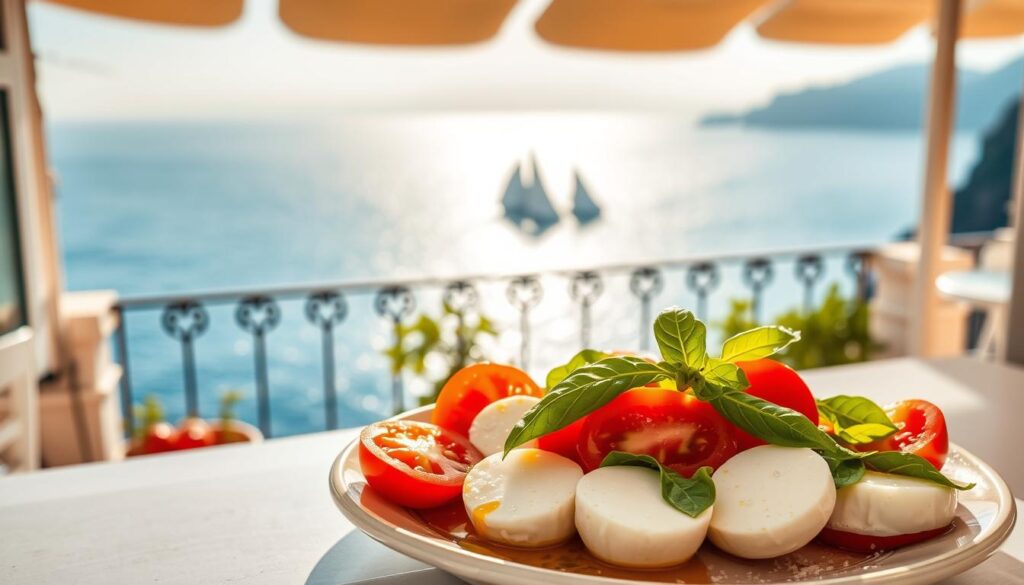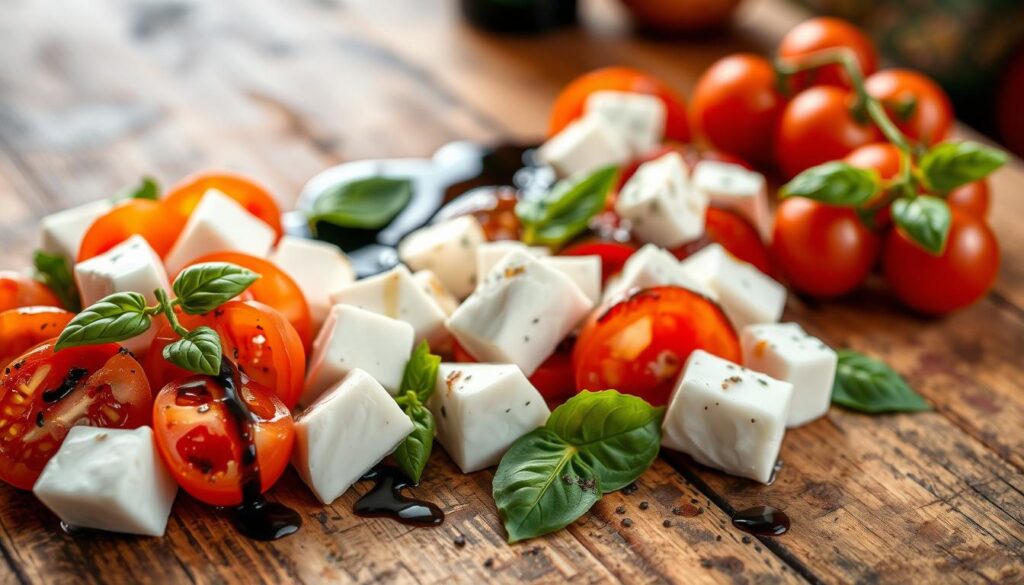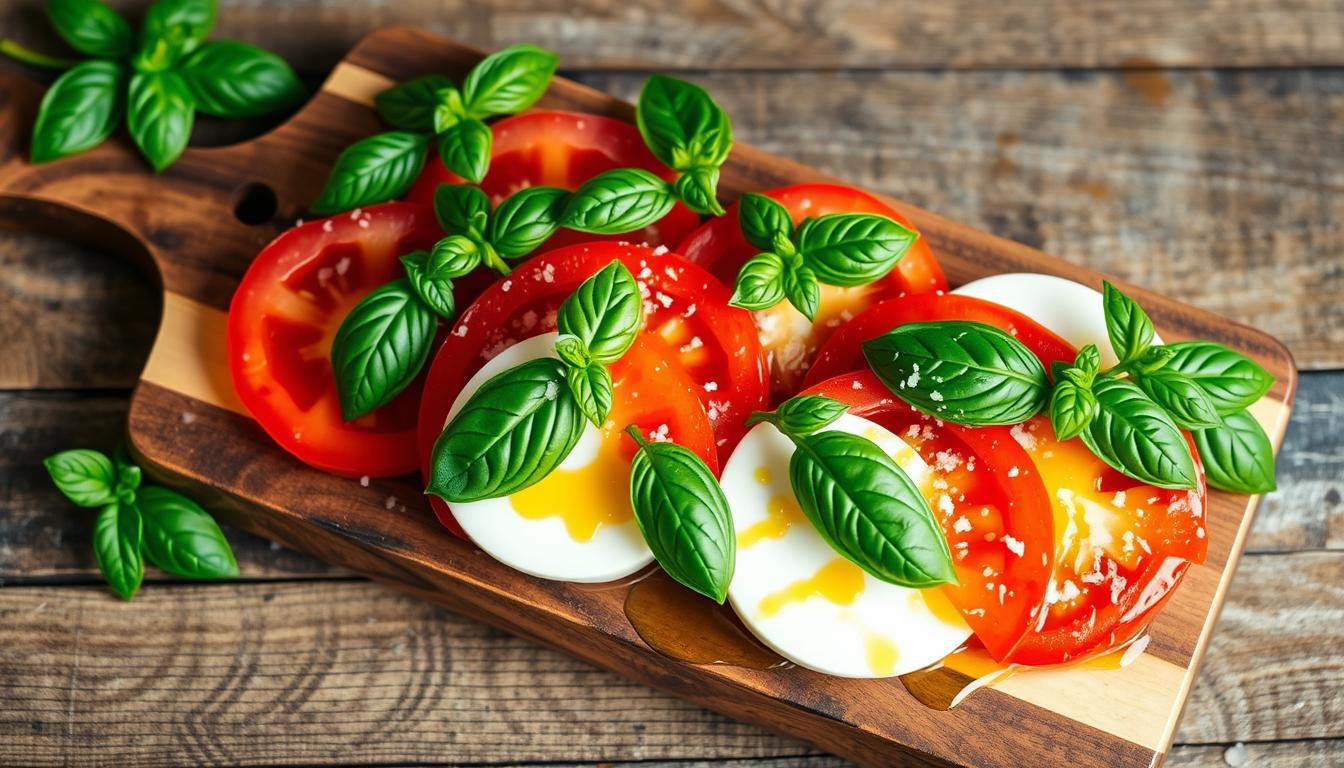A caprese salad is truly magical. It combines bright red tomatoes, creamy mozzarella, and fragrant basil leaves. These simple ingredients burst with summer’s flavors. It’s like a hug from the earth, turning any meal into a celebration.
Caprese salad celebrates fresh ingredients. Imagine slicing a warm tomato, pairing it with creamy mozzarella, and finishing with fresh basil. It’s more than a recipe; it’s a reminder of the power of simple flavors.
We’ll show you how to make a caprese salad in 5 easy steps. It’s perfect for a light lunch or a summer dinner side. Every bite will show you why this Italian classic is timeless.
Key Takeaways
- Use fresh mozzarella packed in water for the creamiest texture.
- Heirloom tomatoes add vibrant color and complex flavor.
- Fresh basil elevates both taste and presentation.
- High-quality olive oil and sea salt enhance natural ingredients.
- Balsamic glaze or pesto offers optional upgrades for extra depth.
A caprese salad is truly magical. It combines bright red tomatoes, creamy mozzarella, and fragrant basil leaves. These simple ingredients burst with summer’s flavors. It’s like a hug from the earth, turning any meal into a celebration.
Caprese salad celebrates fresh ingredients. Imagine slicing a warm tomato, pairing it with creamy mozzarella, and finishing with fresh basil. It’s more than a recipe; it’s a reminder of the power of simple flavors.
We’ll show you how to make a caprese salad in 5 easy steps. It’s perfect for a light lunch or a summer dinner side. Every bite will show you why this Italian classic is timeless.
Key Takeaways
- Use fresh mozzarella packed in water for the creamiest texture.
- Heirloom tomatoes add vibrant color and complex flavor.
- Fresh basil elevates both taste and presentation.
- High-quality olive oil and sea salt enhance natural ingredients.
- Balsamic glaze or pesto offers optional upgrades for extra depth.
What Makes a Traditional Caprese Salad Special
The italian salad celebrates fresh ingredients and centuries of cooking. It’s simple yet rooted in mediterranean cuisine. This dish has stood the test of time.
The Color Palette of Italian Heritage
The salad’s colors—red tomatoes, white mozzarella, and green basil—are more than just hues. They echo Italy’s flag, making each dish a tribute to its roots.
The Perfect Balance of Flavors
Each part of the salad works together:
- Tomatoes add a tangy kick
- Mozzarella brings creamy richness
- Basil adds a fresh, herbaceous note
- Olive oil brings a nutty depth
This mix of flavors and textures is both comforting and elegant.
Why Simple Ingredients Create Complex Tastes
Top-notch caprese uses fresh ingredients at their best. It’s a key part of mediterranean cuisine. Think about:
- Buffalo mozzarella from Campania
- Heirloom tomatoes full of summer flavor
- Basil picked just before serving
Using the best ingredients, like Lucini’s olive oil, lets their natural flavors shine. This approach keeps the salad true to tradition yet feels fresh and modern.
The Origin Story of This Classic Italian Dish
Caprese salad started in 1926 at the Grand Hotel Quisisana on Capri, Italy. Chefs made it to honor the Italian flag—tomatoes for red, mozzarella for white, and basil for green. It was more than food; it was a symbol of national pride during a Futurist conference.

King Farouk of Egypt loved this caprese salad when he visited in the 1950s. His love for it helped make it famous around the world. The recipe changed over time, using buffalo milk mozzarella for its creamy taste.
The dish is part of mediterranean cuisine, focusing on fresh, seasonal ingredients. It went from a patriotic gesture to a global favorite. Today, it’s enjoyed as an appetizer or a light meal, connecting Italy’s culinary past with today’s tables.
Essential Ingredients for an Authentic Caprese Salad
Choosing the right ingredients is key to a great Caprese salad. Here’s how to pick each part perfectly:
Selecting the Perfect Tomato
Heirloom or beefsteak tomatoes are best for this salad. They should have firm skin that’s slightly soft when pressed. Avoid tomatoes that are too soft or hard.
The smell should be sweet, not sour or earthy.
Choosing Quality Mozzarella
Fresh mozzarella in water is essential for a creamy texture. Buffalo milk mozzarella is richer, but cow’s milk works too. Stay away from pre-shredded or dry mozzarella.
Fresh Basil: The Aromatic Star
- Choose basil leaves that are bright green and have no brown spots.
- Store stems in water like flowers to keep them fresh.
- Pat dry the basil before using to avoid sogginess.
Extra Virgin Olive Oil Considerations
Use top-notch fresh ingredients like extra-virgin olive oil. It should have a mild peppery taste. Drizzle it sparingly to enhance the flavors without overpowering.
Balsamic Glaze vs Balsamic Vinegar
Balsamic glaze turns into a syrup for drizzling. Vinegar adds a tangy taste. Use glaze for finishing touches and vinegar in dressings. Both should be aged for a deeper flavor.
Kitchen Tools You’ll Need for Preparation
Making the perfect caprese salad begins with the right tools. You don’t need a fancy kitchen. Just a few basics will do. Let’s look at what you need.
- Sharp knife: A serrated knife cuts tomatoes without squishing them. A sharp chef’s knife is best for mozzarella.
- Cutting board: Pick one with a groove to catch tomato juices. It keeps your counter clean.
- Serving platter: Choose a white ceramic or wooden board. It highlights the salad’s colors.
- Bowl and spoon: Use them for mixing dressings or testing balsamic glaze.
Optional tools like herb scissors or an oil dispenser can enhance your salad. But they’re not must-haves. A small whisk is great for mixing dressings. Remember, even simple tools work well.
What’s most important is the quality of your fresh ingredients. Use a sharp knife for clean cuts. And make sure your cutting surface is stable to avoid slipping.
Whether you’re drizzling balsamic or arranging basil, keep it simple. Your ingredients are the main attraction. No need for fancy gadgets!
Step-by-Step Guide to Making Caprese Salad
Making the perfect caprese salad is easy. Just follow these steps to get the right mix of texture and taste:
- Begin by washing ripe tomatoes under cool water. Pat them dry and cut into ½-inch rounds. Use a sharp knife for clean cuts and to keep the tomato edges crisp.
- Cut fresh mozzarella into slices that match the tomato’s thickness. Buffalo mozzarella is best. Avoid squeezing it too hard to keep it light.
- Rinse basil leaves gently. Pat them dry without bruising them. Tear larger leaves for easier arrangement.
- Place slices on a platter in alternating layers: tomato, mozzarella, and basil. Create a striking spiral pattern with the layers.
- Just before serving, drizzle with extra virgin olive oil. Add a thin line of balsamic reduction for a tangy touch. Season with sea salt and pepper.
Pro tip: Use heirloom tomatoes for a colorful salad. Assemble the salad just before serving to avoid sogginess. A sprinkle of dried oregano adds a Mediterranean flair without overpowering the basil.
Common Mistakes to Avoid When Making Caprese
Making a great caprese salad means avoiding a few key mistakes. Here’s how to keep your salad fresh and full of flavor:
- Overlooking mozzarella quality: Choose fresh mozzarella like buffalo or fiordilatte. Avoid pre-shredded or hard-block types, as they don’t have the right texture.
- Unripe tomato choices: Pick ripe tomatoes like Pachino or beefsteak. Unripe tomatoes are mealy and tasteless.
- Pre-dressing too early: Add olive oil and balsamic just before serving. This keeps fresh ingredients like basil and tomato fresh.
- Salting mistakes: Lightly salt tomatoes before assembling. Never salt mozzarella directly, as it loses moisture.
| Mistake | Solution |
|---|---|
| Using refrigerated tomato | Bring tomatoes to room temperature before slicing to enhance juiciness |
| Overdrying ingredients | Pat sliced tomato gently to remove excess moisture without bruising |
| Adding basil too early | Tuck basil leaves in only minutes before serving to prevent wilting |
Pairing mozzarella with room-temperature tomato brings out the best flavors. Don’t add mayonnaise; let the ingredients speak for themselves. A drizzle of olive oil and sea salt flakes will complete it beautifully.
How to Elevate Your Caprese Salad with Balsamic Glaze
Turn your caprese salad into a stunning dish with balsamic glaze. This simple addition brings depth to the classic italian salad. It balances sweet and tangy flavors without overwhelming the fresh ingredients.
Making Homemade Balsamic Reduction
Begin by simmering balsamic vinegar in a small saucepan until it thickens into a glossy balsamic glaze. Here’s how:
- Pour ½ cup balsamic vinegar into a saucepan and bring to a boil.
- Reduce heat to low and simmer uncovered, stirring occasionally.
- Cook 10–20 minutes until reduced by half, testing readiness by checking for a syrupy drip from a spoon.
| Tip | Action |
|---|---|
| Storage | Transfer to a jar and refrigerate up to 1 month |
| Rescue Over-Reduced Glaze | Add a splash of water and reheat gently |
| Substitute | Use store-bought glaze for quick results |
Application Techniques for Visual Appeal
- Zigzag lines across the plate for a casual look
- Spiral patterns around ingredients for elegance
- Dot clusters to highlight key components
Use 1–2 tablespoons total. The dark glaze contrasts beautifully with red tomatoes, white mozzarella, and green basil. It adds a finishing touch, like jewelry on a simple outfit!
Seasonal Adaptations to Your Caprese Salad

Caprese salad isn’t just for summer. You can enjoy it all year with a few tweaks. Here’s how to keep its flavors bright:
Summer: Peak Tomato Season
Summer is the perfect time to pick vine-ripened tomatoes at farmers’ markets. Try heirloom tomatoes for their colors and tastes. For a twist, layer tomatoes with peaches or strawberries.
Drizzle with extra virgin olive oil and flaky salt. This brings out their sweetness.
Winter: Working with Hothouse Ingredients
In winter, choose cherry tomatoes or hydroponic ones when vine tomatoes are hard to find. Roasting tomatoes makes a tangy jam. Add minced garlic and balsamic reduction for flavor.
Pair it with toasted whole wheat bread for a nice texture.
| Season | Tomatoes | Herbs & Additions |
|---|---|---|
| Summer | Heirloom tomatoes, vine-ripened | Fresh basil, peaches, strawberries |
| Winter | Cherry tomatoes, roasted into jam | Thyme, garlic, balsamic glaze |
Growing Your Own Basil for Year-Round Freshness
Grow basil indoors in sunny spots with small pots. Water it a little and trim leaves often. This makes it grow.
Save extra basil by freezing it in olive oil cubes or making pesto. This way, you have fresh basil all year.
Creative Variations on the Classic Caprese
Caprese salad is simple but open to creativity. Try these twists while keeping its Mediterranean roots in mind. Whether you’re planning a picnic or just want to try something new, these ideas will keep your dish exciting:
- Burrata & Peach Medley: Swap fresh mozzarella for creamy burrata and pair with ripe peaches. Toss with balsamic glaze for a sweet-savory balance.
- Avocado Twist: Add avocado slices for creaminess. Perfect for vegetarian diets, this version layers avocado, heirloom tomatoes, and basil pesto.
- Watermelon Feta Fusion: Substitute tomatoes with watermelon and mix in feta. Drizzle with honey and mint for a refreshing summer treat.
- Grilled Skewers: Thread tomatoes, mozzarella, and basil onto skewers. Grill briefly for caramelized edges and serve as an appetizer.
- Caprese Quesadilla: Stuff tortillas with shredded mozzarella, diced tomatoes, and basil. Cook until crispy and top with pesto.
For a hearty meal, mix caprese ingredients into pasta or grain bowls. Jersey Girl Cheese’s fresh mozzarella or Mozzarella di Bufala Campana add premium texture. Get inventive—try caprese pizza with pesto crust or top salads with roasted red peppers. Always balance acidity, herbs, and textures to stay true to the dish’s soul. Every variation should honor its Mediterranean roots while inviting new flavors.
Health Benefits of Mediterranean Cuisine in Your Caprese
Caprese salad is more than just a pretty dish—it’s packed with nutrients. It’s all thanks to Mediterranean cuisine. Each fresh ingredient makes it a heart-healthy choice. Let’s see how this veggie favorite boosts your health.
Nutritional Profile of a Vegetarian Favorite
Tomatoes are full of lycopene, vitamins A and C, and fiber. Fresh mozzarella brings protein and calcium. Basil adds vitamin K and antioxidants. Olive oil’s good fats are great for your heart, and balsamic’s antioxidants boost your health. Together, they make a balanced mix of nutrients.
How Caprese Fits into a Balanced Diet
Studies show the Mediterranean diet cuts down heart disease risk by 25% in 12 years. Here’s why Caprese fits right in:
- It’s full of plant-based nutrients: Tomatoes and basil are key to the diet’s veggie focus.
- It’s got healthy fats: Olive oil replaces bad fats found in other foods.
- It’s easy to make your own: Add cucumbers or bell peppers for more fiber and vitamins.
Try it with grilled chicken or fish for more protein. Choose low-fat mozzarella to cut calories without losing flavor. A few changes make it perfect for any diet.
Serving Suggestions: From Appetizer to Main Course
Caprese salad is more than a side dish. It’s a versatile star that can light up any event. Whether it’s a BBQ or a cozy dinner, this Italian salad is perfect. Start with small bites: arrange slices on skewers for a cocktail hour crowd or layer it on a shared platter with crusty bread for gatherings.
For vegetarian mains, add a protein boost with grilled tofu or chickpeas. Pair it with italian salad classics like pesto gnocchi or garlic bread for a complete meal.
- Appetizer: Serve on mini crostini with drizzled balsamic. Add arugula for a peppery contrast.
- Side dish: Accompany grilled chicken or fish. The acidity cuts through rich dishes like pork chops.
- Main course: Layer with farro or quinoa. Top with a fried egg for a hearty vegetarian option.
| Pairing | Match |
|---|---|
| Caprese salad | Pinot Grigio or rose wine |
| Creamy caprese pasta salad | Herbed focaccia for dipping |
| Vegetarian mains | Roasted vegetable platters or lentil soup |
For summer entertaining, serve in bowls with lemon-tahini dressing. Add prosciutto for salty balance. At brunch, toss with scrambled eggs and avocado. Always keep basil leaves fresh by storing stems in water. This caprese salad adapts to any table—just let the ingredients shine!
Why Our Simple Caprese Salad Recipe Will Become Your Go-To Summer Dish
When summer’s ripe tomatoes arrive, there’s no better way to celebrate than with our caprese salad. This italian salad isn’t just a meal—it’s a celebration of fresh ingredients at their peak. With minimal prep time and maximum flavor, it’s the kind of dish that earns a permanent spot in your recipe rotation.
Think of it as summer on a plate. Beefsteak tomatoes, creamy mozzarella, and fragrant basil come together in under 15 minutes. The beauty lies in its simplicity: no complicated techniques, just arranging layers to let the ingredients shine._guests always remark on how impressive it looks yet how effortless it feels. And with options like swapping in burrata for creaminess or adding peaches for sweetness, it adapts to every occasion.
Our readers rave about how this recipe transforms weeknight dinners and backyard gatherings alike. The nutritional balance—167 calories per serving—makes it guilt-free too. Whether served with grilled bread or as a side for pizza, its versatility never fades. And don’t forget the balsamic glaze tip: a small addition that elevates every bite.
So when the farmers’ market bursts with color, grab those tomatoes and basil. This caprese salad isn’t just a recipe; it’s a summer ritual. Try it once, and you’ll see why it becomes a staple. Share your tweaks and tag us—we’d love to see your version of this timeless classic!

